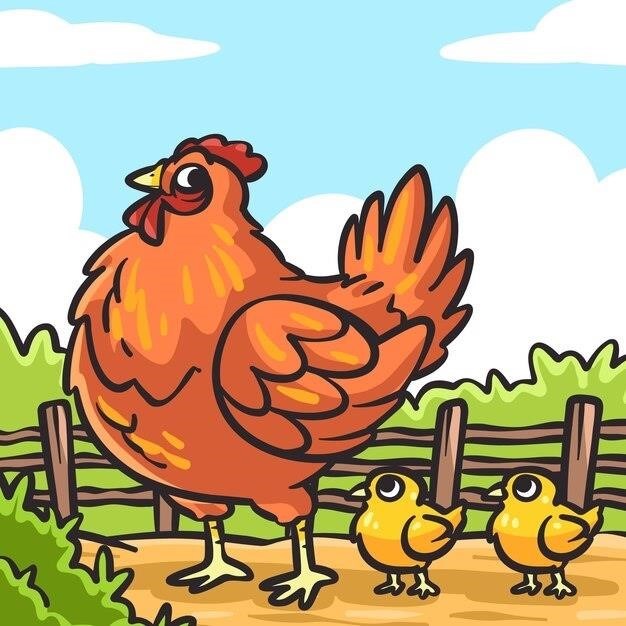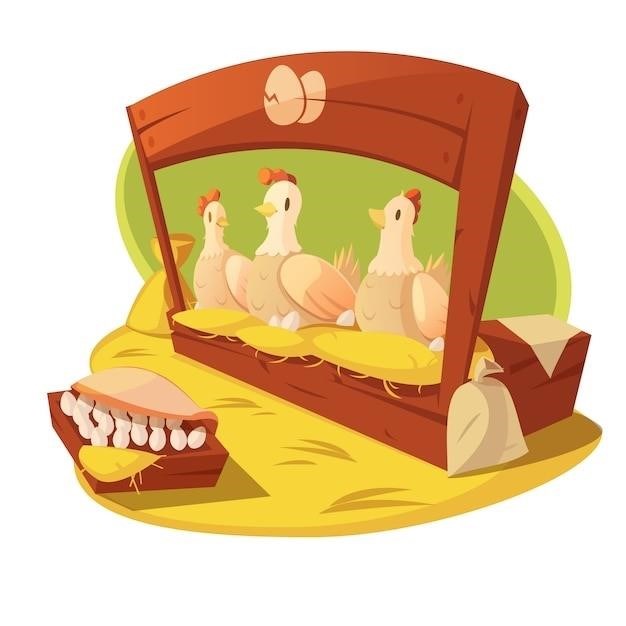the little red hen book pdf
The Little Red Hen⁚ A Timeless Classic
The Little Red Hen is a classic children’s story that has been enjoyed by generations. There are many versions of the story available, but the basic plot remains the same. You can find free PDFs of the story online, such as the version published by Golden Press in 1981, which is available on the Internet Archive. This version is a great choice for young children, as it features simple text and delightful illustrations.

The Story’s Origins and Popularity
The Little Red Hen, a beloved children’s tale, has roots deeply embedded in oral storytelling traditions, its exact origin shrouded in time. While no definitive creator can be named, the story’s simple yet profound message of hard work and responsibility resonated across cultures, finding its way into various folk tales and eventually into written form.
The story’s enduring popularity can be attributed to its universal themes, relatable characters, and engaging narrative. The Little Red Hen, a hardworking and determined protagonist, serves as a positive role model for children, while the lazy barnyard animals offer a contrasting perspective on responsibility. The story’s simple language and straightforward plot make it accessible to young readers, while its underlying message holds relevance even for adults. The Little Red Hen remains a treasured story, passed down through generations, its timeless appeal ensuring its continued place in children’s literature.
The Little Red Hen’s Character Traits
The Little Red Hen, despite her diminutive size, is a powerful symbol of industriousness and self-reliance. Throughout the story, she exhibits a strong work ethic, taking initiative and diligently completing tasks despite the unwillingness of her friends to help. Her determination shines through as she perseveres, planting, harvesting, grinding, and baking the wheat, all on her own. The Little Red Hen’s character is also defined by her patience and kindness. Despite the laziness of her friends, she never gives up on them, consistently offering opportunities for them to participate. Her unwavering commitment to completing the task, even when faced with resistance, highlights her strong sense of responsibility and self-motivation.
The Theme of Hard Work and Responsibility
The Little Red Hen story powerfully illustrates the importance of hard work and responsibility. The Little Red Hen’s unwavering commitment to her task, from planting the wheat to baking the bread, serves as a compelling example for young readers. By taking initiative and diligently completing each step, she demonstrates the rewards that come from perseverance and dedication. The story highlights the contrast between the Little Red Hen’s industriousness and the laziness of her friends, who are only interested in enjoying the fruits of her labor. This stark difference emphasizes the value of personal responsibility and the consequences of shirking one’s duties. Ultimately, the Little Red Hen’s story teaches children that hard work and taking ownership of their actions lead to satisfaction and success.
The Little Red Hen’s Friends⁚ The Cat, the Dog, and the Pig
The Little Red Hen’s friends, the cat, the dog, and the pig, play a crucial role in showcasing the story’s theme of responsibility. They are depicted as lazy and self-centered, unwilling to participate in any of the hard work required to produce bread. The cat, often depicted as a lazy and pampered creature, is content to sleep in the sun. The dog, known for its playful nature, is too busy chasing its tail to assist. The pig, usually portrayed as gluttonous and indolent, is only interested in eating and growing fat. Their unwillingness to help contrasts sharply with the Little Red Hen’s hardworking nature, highlighting the importance of contributing to a shared effort. These characters serve as cautionary examples for young readers, emphasizing the importance of responsibility and the consequences of shirking one’s duties.
The Little Red Hen’s Journey from Wheat to Bread
The Little Red Hen’s journey from wheat to bread is a captivating process that showcases the transformation of a simple grain into a delicious food. It begins with the discovery of wheat seeds, which the Little Red Hen decides to plant. The story often depicts her diligently tending to the wheat, watering it, and weeding it as it grows. Once the wheat is ripe, she harvests it, threshes it to separate the grain from the stalks, and grinds it into flour. The Little Red Hen’s determination and hard work are evident throughout this process. Finally, she bakes the flour into bread, showcasing the culmination of her efforts and the reward for her diligence. This journey highlights the importance of hard work, perseverance, and the satisfaction that comes from creating something from scratch; The process of transforming wheat into bread provides a tangible example of how effort leads to a rewarding outcome.
The Moral of the Story
The Little Red Hen serves as a timeless tale that imparts a valuable moral lesson about the importance of hard work, responsibility, and self-reliance. The story highlights the contrast between the Little Red Hen’s diligence and her friends’ laziness. While the Little Red Hen diligently works to plant, harvest, grind, and bake the wheat, her friends—the cat, the dog, and the pig—refuse to help, preferring to indulge in leisure activities. However, when the bread is ready, they eagerly want to partake in the fruits of her labor. The story emphasizes that those who avoid responsibility and rely on others will not reap the rewards of their efforts. The moral message encourages children to embrace hard work, take ownership of their actions, and understand that effort leads to deserved rewards. It teaches the importance of contributing to a shared goal and the value of self-sufficiency.
The Little Red Hen in Different Versions
The Little Red Hen story, a folk tale, has been retold and adapted countless times, appearing in various forms across cultures and languages. While the core message remains consistent, variations in the characters, plot details, and even the moral of the story can be observed. Some versions feature additional characters, like a mouse or a bird, expanding the cast of friends who refuse to help. Others may focus on the process of making bread, emphasizing the steps involved in transforming wheat into a delicious loaf. The Little Red Hen’s personality might also vary, with some interpretations portraying her as more assertive and others showcasing a softer, more patient approach. The adaptability of the story allows for creative retellings that resonate with different audiences and cultures, ensuring its enduring popularity and relevance for generations of children.

The Little Red Hen in Modern Adaptations
The enduring popularity of The Little Red Hen has led to numerous modern adaptations, reflecting contemporary values and themes. These versions often update the story’s setting and characters, bringing it closer to modern children’s experiences. For instance, some adaptations might feature the Little Red Hen living in a bustling city instead of a traditional farm, with her friends representing diverse backgrounds and personalities. The themes of hard work and responsibility are often presented in new ways, emphasizing the importance of teamwork and collaboration in achieving shared goals. Modern adaptations may also introduce environmental themes, highlighting the value of sustainable practices and responsible resource management. These creative retellings ensure that The Little Red Hen continues to resonate with children today, teaching valuable lessons in a way that is both engaging and relevant to their lives.
The Little Red Hen in Popular Culture
The Little Red Hen’s enduring popularity is evident in its presence across various aspects of popular culture. The story has inspired countless creative works, from children’s songs and plays to educational materials and even video games. The Little Red Hen’s image has been used in advertising and branding, reflecting the character’s association with hard work, perseverance, and self-reliance. The story’s themes have also been explored in television shows and films, often serving as a basis for moral lessons or social commentary. For example, the story’s message of responsibility and the importance of contributing to a shared goal has been used to illustrate the importance of teamwork and cooperation in various contexts. The Little Red Hen’s enduring presence in popular culture testifies to its timeless appeal and its relevance to audiences of all ages.
The Little Red Hen⁚ A Learning Tool for Children
The Little Red Hen is a valuable learning tool for children, offering a range of educational benefits. The story’s simple plot and engaging characters make it easy for young children to understand and follow. It teaches important life lessons such as the value of hard work, responsibility, and self-reliance. The story’s repetitive phrases and predictable structure help children develop early literacy skills, including vocabulary, comprehension, and phonemic awareness. The Little Red Hen also provides opportunities for children to learn about the process of making bread, from planting wheat to baking a loaf. This can be a fun and engaging way for children to learn about where their food comes from. The story’s moral message about the importance of contributing to a shared goal can also encourage children to develop a sense of community and cooperation. Teachers and parents can use The Little Red Hen as a springboard for discussions about these themes, fostering children’s social and emotional development. The Little Red Hen’s versatility as a learning tool makes it a valuable resource for early childhood education.
The Little Red Hen⁚ A Story for All Ages
The Little Red Hen is not just a children’s story; it transcends age boundaries and resonates with readers of all ages. The themes of hard work, responsibility, and the consequences of laziness are timeless and universal, making the story relevant to adults as well. The Little Red Hen’s unwavering determination to achieve her goal, despite the inaction of her friends, serves as a powerful inspiration for readers of all ages. The story’s simplicity and directness allow for multiple interpretations, making it a rich and engaging experience for both children and adults. The Little Red Hen’s journey from wheat to bread, while seemingly mundane, becomes a metaphor for the challenges and rewards of hard work and self-reliance, a message that resonates with readers regardless of their age. The story’s enduring popularity and its ability to connect with people of all ages are a testament to its timeless appeal and its enduring relevance.
Where to Find The Little Red Hen Book in PDF Format
Finding a PDF version of “The Little Red Hen” is easier than you might think. Many online resources offer free access to classic children’s tales in this format. The Internet Archive is a great starting point, hosting a variety of versions, including the 1981 Golden Book edition. Project Gutenberg also provides a public domain version with illustrations. For a more modern adaptation, explore websites like Olive Hackney, which offers a “Little Red Hen” ebook specifically designed for Year 1 reading. Additionally, numerous websites dedicated to sharing educational resources, like Starfall.com, provide free customizable worksheets and lesson plans based on the story. Searching online using keywords like “The Little Red Hen PDF” will lead you to a wealth of options, ensuring you find the perfect version to enjoy with children or for personal use.
The Little Red Hen story continues to resonate with readers of all ages, providing valuable lessons about responsibility, hard work, and the importance of contributing to a shared goal. The story’s timeless appeal has led to its adaptation in various forms, including numerous illustrated books, online resources, and even educational materials. The availability of free PDF versions of “The Little Red Hen” makes it easy for parents, educators, and anyone interested in this classic tale to access and share it with others. Whether used for personal enjoyment, educational purposes, or as a springboard for discussions on important life values, “The Little Red Hen” remains a cherished and relevant story in our digital age.